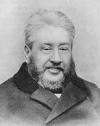Christ’s
Eternal Love For His Church
“Mark
the hypocrites that come into the Christian church and that mar her purity.
Observe the formalists that crowd her courts, that sit as God’s people sit, and
sing as God’s people sing, but have hearts full of rottenness and villainy.
Observe even the true saints—how unbelieving, how carnally-minded often, how
childish, how ready to murmur against God! How few of them are fathers in
Israel! When they ought to be teachers, they have need to be instructed in the
first elements of the faith. What heresies come into the church, and how many
unstable minds are carried away with them. What divisions there are! How one
saith, “I am of Paul,” and another, “I am of Apollos,” and a third, “I am of
Christ” (1Co 1:12). What envyings there are, what backbitings of those that are
eminent for usefulness. What suspicions against those who are a little more
zealous than their fellows! My brethren, what a lack of affection we can see in
the church of Christ; how little brotherly kindness, how little sympathy. On
the other hand, how much of pride is discovered…How we find some claiming to be
lords in God’s heritage and taking to themselves names and titles to which they
have no right, seeing that “One is our Master,” and we are not to be called
“Rabbi” among men. When I look at the church even with a blinded eye, having no
power to see her as God’s omniscient eye must see, yet is she covered with
spots. Well may she wear her veil and say, “Look not upon me, because I am
black, because the sun hath looked upon me” (Song 1:6). O church of God, how is
it Jesus Christ could love thee, for even in thy church capacity and
church-estate how much there is that could make Him say, “Thou art reprobate
silver; thou shalt be cast into the fire” (see Jer. 6:30). Lo, how much there is that must make Him say of
thee, “Salt is good: but if the salt have lost his savour, wherewith shall it
be seasoned?...It is thenceforth good for nothing, but to be cast out, and to
be trodden under foot of men” (Luke 14:34; Mat 5:13).
And
yet you see, dear friends, it is written that Christ loved His church, and gave
Himself for it. I think I see it—a piece of ground untilled; neither hedged,
nor walled, not covered with vines, nor redolent with the perfume of sweet flowers,
but it is a spot in the wilderness, filled with the thorn, the thistle, and the
brier; her hedges are broken down; the stones of her wall are scattered; the
wild boar out of the wood wasteth her; all kinds of unclean creatures lurk
among her weeds and brambles. Oh, how is it, Thou Lord of glory, that Thou
couldst buy, at the price of Thy heart’s blood, such a waste piece of ground as
that? What couldst Thou see in that garden that Thou shouldst
determine to make it the fairest spot of all the earth, that should yield Thee
the richest of all fruit?
Methinks,
again, I see the church of God, not as a fair maid decorated for the
marriage-day with jewels, and carrying herself right gloriously both in her
person and her apparel; but I see her as a helpless child, neglected by her
parents, cast out, unwashed, unclothed, left uncared for, and covered with her
filth and blood. No eye pities her, no arm comes to bring her salvation. But
the eye of the Lord Jesus looks upon that infant and straightway love beams
forth from that eye, speaks from that lip, and acts through that hand. He says,
“Live!” and the helpless infant is cared for: she is nurtured; she is decked
with dainty apparel; she is fed, clothed, sustained, and made comely through
the comeliness of Him Who chose her at the first. Thus it is that strong love
moved the grace of God, and the church found that Christ gave Himself for it.”
-C.H.
Spurgeon British Preacher 1834-1892






